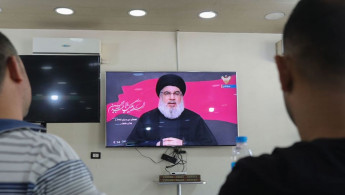Hezbollah's Nasrallah suggests Iran drill for oil off Lebanese coast
In a speech on Sunday, Hassan Nasrallah, the leader of the Lebanese Shia militant group Hezbollah, suggested that Iran could assist the Beirut government in drilling for oil off its coast.
Nasrallah said that if Lebanon was able to tap into its off-shore oil reserves, the country would be able to solve its current national fuel shortage.
Fuel importers are failing to secure adequate supplies from abroad due to a lack of foreign exchange. Hoarding and the siphoning of fuel to sell on the black market have also exacerbated the crisis.
Queues for petrol four lanes deep, and more than a kilometre long, have become an ordinary sight on Lebanese roads. Frequent blackouts plague residential areas and endanger critical infrastructure, while hospitals have issued dire warnings as supplies dwindle to dangerously low levels.
On Sunday, Lebanon’s caretaker government approved a 66 percent price hike in petrol prices as a last-minute measure to stave off the complete lifting of subsidies. The new prices, however, will only last until the end of September, when the central bank's allotment for fuel subsidies will run dry.
Lebanon’s offshore oil and gas reserves are estimated to be valued at around $250 billion, or about eight times Lebanon’s 2020 GDP. Studies have also judged the reserves to contain between 440-670 million barrels of oil and between 12-25 trillion cubic feet of natural gas.
If estimates prove to be accurate and Lebanon manages to successfully exploit its offshore reserves, it could be a lifeline for the sinking economy.
However, the country’s first attempt at exploring its reserves in 2020 came up short, with no commercially viable quantity of gas reservoirs found in the offshore "block" examined.
The presence of reserves is also no guarantee that extraction will occur in a timely or profitable manner. Lebanon’s Mediterranean neighbour Cyprus discovered the existence of the Aphrodite offshore gas field in 2011, but has yet to start drilling due to geopolitical disputes with Turkey and Israel.
Lebanon similarly has maritime disputes with Israel, as both countries lay claim to a 330 square mile stretch of sea between the two countries. The contested area contains portions of natural gas reservoirs—and until the maritime boundaries between the two countries are decided, offshore oil drilling is unlikely to occur in the concerned blocks.
Nasrallah also said that a tanker carrying Iranian oil was on its way to Lebanon, and that it would be followed by another ship within the coming few days.
The Hezbollah leader gave few more details about the vessel but warned the US and Israel from stopping it, saying that it was considered "Lebanese territory" from the moment it set sail towards Lebanon.
The US and Israel have been mostly mum on the subject, but in an interview with Al-Arabiya on Thursday, US ambassador to Lebanon Dorothy Shea said that "Lebanon can do whatever it wants".
Just a few days after Nasrallah announced that the first ship of Iranian oil was coming to Lebanon, Ambassador Shea called Lebanese President Michel Aoun and gave him the green light to start importing Jordanian electricity via Syria.
Though the proposal for such a deal had reportedly been in the cards for months, the concerned countries were waiting for permission from Washington so as to avoid being targeted by US Syria sanctions.
"This decision has been in the works for a while but the timing is interesting as the US ambassador announced [the Jordanian electricity deal] on the same day that Nasrallah said that the tanker is coming to Lebanon," Hanin Ghaddar, Friedmann Fellow at the Washington Institute, told The New Arab.
"We're not sure if the Iranian tanker is actually happening or not, and we're not sure if the fuel will be allowed to enter Lebanon if it does come," Ghaddar said.
Ghaddar said that it is possible that Hezbollah’s announcement of the Iranian ship could be "just designed for media consumption", as its support base is suffering quite deeply from the country’s fuel shortages.
"Hezbollah's role as a provider of fuel is unsustainable because its constituency is suffering even more from shortages as the hoarding of fuel is worse in the south [of Lebanon]," she said.
After the announcement of the Iranian ship had set sail on Thursday, graphics were shared on social media depicting an Iranian tanker breaking through the word "USA", seemingly depicting Hezbollah smashing what it dubbed an "American-led blockade" of Lebanon.
Later, on Monday, Lebanese users took to Twitter with the hashtag "Our boat is for all of Lebanon", in response to Nasrallah's Sunday speech, when he promised that Iranian fuel would be for all of Lebanese, not just for the militant group or its supporters.





 Follow the Middle East's top stories in English at The New Arab on Google News
Follow the Middle East's top stories in English at The New Arab on Google News
![The UAE is widely suspected of arming the RSF militia [Getty]](/sites/default/files/styles/image_330x185/public/2024-11/GettyImages-472529908.jpg?h=69f2b9d0&itok=Yauw3YTG)
![Netanyahu furiously denounced the ICC [Getty]](/sites/default/files/styles/image_330x185/public/2024-11/GettyImages-2169352575.jpg?h=199d8c1f&itok=-vRiruf5)
![Both Hamas and the Palestinian Authority welcomed the ICC arrest warrants [Getty]](/sites/default/files/styles/image_330x185/public/2024-11/GettyImages-2178351173.jpg?h=199d8c1f&itok=TV858iVg)